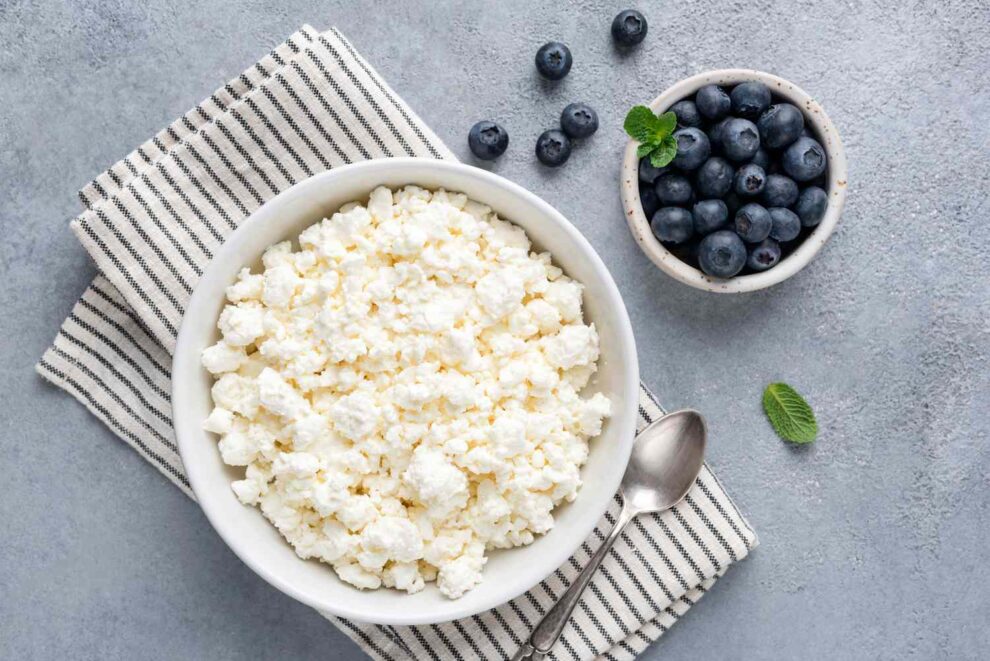Cottage cheese, the chunky low-fat dairy product that took off as a diet fad in the 1950s, is trending again this year.
Viral TikTok videos show that cottage cheese can be used to make ice cream, scrambled eggs, and as a topping for toast.
“Cottage cheese is definitely having its moment on social media. Its mild flavor and creamy texture make it versatile for both savory and sweet dishes,” Lily Lam, MFN, RD, a bariatric nutrition coordinator at Cedars-Sinai Marina Weight Management Center, told Verywell in an email.
The flavor and texture of cottage cheese are just part of the reason that it’s all over the internet. It’s also a low-calorie food packed with high-quality protein if you’re looking to manage your weight, Lam said.
A 1/2 cup serving of small curd cottage cheese contains 111 calories and 12.5 g of protein, according to the USDA.1 Protein intake can help you feel full while reducing hunger hormones, hence lowering your calorie intake.
Why Is Cottage Cheese Healthy?
In addition to protein, cottage cheese is also rich in vitamins and minerals like calcium, phosphorous, magnesium, and B-vitamins,1 which are essential for bone health, energy metabolism, and red blood cell formation, according to Lam.
Another reason cottage cheese is popular is its low saturated fat content. Most dietary advice, including guidance from the American Heart Association, recommends cutting down on foods with saturated fat.2 Eating too much saturated fat can raise low-density lipoprotein (LDL), or “bad” cholesterol, and increase heart disease risk.
A half cup of cottage cheese has less than two grams of saturated fat,1 but the same amount of ricotta cheese has almost 8 g3 and a 1/2 cup of cream cheese contains about 23 g.4
The Dietary Guidelines for Americans recommend limiting saturated fats to 10% or less of your daily calories, which would be 200 calories for someone consuming 2,000 calories per day.5
“Swapping high-fat cheeses with cottage cheese is an easy way to improve the nutritional quality of the dish. For example, you can use cottage cheese in lasagna, frittatas, or scrambles,” Lam said.
But Should You Eat Cottage Cheese Regularly?
Lam said cottage cheese can be used “as a substitute for any recipe that calls for mayonnaise, sour cream, or heavy cream.” It’s also a great ingredient for creamy salad dressings and pasta sauces.
Although cottage cheese is versatile and trendy, it has a relatively high amount of sodium. A 1/2 cup of cottage cheese has about 350 mg of sodium,1 while the same amount of whole milk Greek yogurt only has about 42 mg.6
Adults should get less than 2,300 mg of sodium per day to reduce high blood pressure and heart disease risk.5
You can buy low and no-sodium cottage cheese, but it’s best to eat a varied diet instead of focusing on one type of food, according to Jamie Mok, MS, RDN, RYT, a registered dietitian nutritionist based in Los Angeles, California.
“While cottage cheese is a nutritious food, eating too much of anything—and not enough of others—isn’t healthy,” Mok told Verywell in an email.
He added that diet trends can be restrictive, unsustainable, and unlikely to yield long-term results especially if the trend limits variety.
“Food trends can be great for introducing, or reintroducing, nutritious foods into our diets if they add variety to our diet, help to fill nutritional gaps, meet individual dietary goals, and excite us to try new foods in different ways,” Mok said.
Source : Very Well Health































